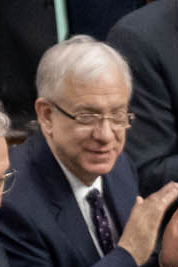This article relies largely or entirely on a single source .(February 2010) |
The Canadian House of Commons Standing Committee on Environment and Sustainable Development (ENVI) is a standing committee in the House of Commons of Canada.
This article relies largely or entirely on a single source .(February 2010) |
The Canadian House of Commons Standing Committee on Environment and Sustainable Development (ENVI) is a standing committee in the House of Commons of Canada.
| Party | Member | District | |
|---|---|---|---|
| Liberal | Francis Scarpaleggia, Chair | Lac-Saint-Louis, QC | |
| Liberal | Terry Duguid | Winnipeg South, MB | |
| Liberal | Lloyd Longfield | Guelph, ON | |
| Liberal | Leah Taylor Roy | Aurora—Oak Ridges—Richmond Hill, ON | |
| Liberal | Joanne Thompson | St. John's East, NL | |
| Liberal | Patrick Weiler | West Vancouver—Sunshine Coast—Sea to Sky Country, BC | |
| Conservative | Damien Kurek, Vice-Chair | Battle River—Crowfoot, AB | |
| Conservative | Gérard Deltell | Louis-Saint-Laurent, QC | |
| Conservative | Mike Lake | Edmonton—Wetaskiwin, AB | |
| Conservative | Greg McLean | Calgary Centre, AB | |
| Bloc Québécois | Monique Pauzé, Vice-Chair | Repentigny, QC | |
| New Democratic Party | Laurel Collins | Victoria, BC | |

Environmental laws are laws that protect the environment. Environmental law is the collection of laws, regulations, agreements and common law that governs how humans interact with their environment. This includes environmental regulations; laws governing management of natural resources, such as forests, minerals, or fisheries; and related topics such as environmental impact assessments. Environmental law is seen as the body of laws concerned with the protection of living things from the harm that human activity may immediately or eventually cause to them or their species, either directly or to the media and the habits on which they depend.
Charles L. Caccia, was a Canadian politician. Caccia was a Liberal member of the House of Commons of Canada. He represented the Toronto riding of Davenport between 1968 and 2004.

Francis Scarpaleggia is a Canadian politician. He is a member of the Liberal Party of Canada and Member of Parliament for the riding of Lac-Saint-Louis, which encompasses the west of the island of Montreal, Quebec. Scarpaleggia was first elected to the House of Commons of Canada in the 2004 federal election, and was re-elected in 2006, 2008, 2011, 2015, 2019, and 2021. He is chair of the House of Commons Standing Committee on Environment and Sustainable Development and previously served on a variety of House of Commons committees; namely, the committees on Public Safety, Canadian Heritage, Transport, and Government Operations and Estimates. He was also chair of the House of Commons Special Committee on Electoral Reform, a committee created pursuant to a 2015 Liberal election platform commitment on electoral reform. From 2011 to 2021 he served as the chair of the National Liberal Caucus, an eventful period in Canadian politics that saw the Liberal Party of Canada move from third-party status in the House of Commons to forming government in one election cycle under the leadership of Justin Trudeau.
Paul J. DeVillers, is a former Canadian politician. He served as Member of Parliament for the Ontario riding of Simcoe North from 1993 to 2005.

John Norman McKay is a Canadian lawyer and politician. He is the Liberal Member of Parliament for the riding of Scarborough-Guildwood. McKay was Parliamentary Secretary to the Minister of Finance from 2003 to 2006 during the government of Paul Martin, then served as an opposition MP and critic until November 2015 during the government of Stephen Harper. He currently serves as Chair of the Standing Committee on National Defence; Chair of the Canadian Section of the Canada-United States Permanent Joint Board on Defence; and Co-Chair of the Canada-United States Inter-Parliamentary Group.

The Environmental Quality Improvement Act of 1970 is a United States environmental law which was passed to work in conjunction with the National Environmental Policy Act of 1969 (NEPA). One of the two major purposes of the Act was to authorize the creation of an Office of Environmental Quality to provide the professional and administrative staff needed for the Council on Environmental Quality. The second major purpose was to "assure that each Federal department and agency conducting or supporting public works activities which affect the environment shall implement the policies under existing law". To accomplish these purposes, the act gave more responsibilities to the chairman of the Council on Environmental Quality in his new role as director of the Office of Environmental Quality.

Langley was a federal electoral district in the province of British Columbia, Canada, that was represented in the House of Commons of Canada from 2004 to 2015. It was a 327 km2 in area with 117,858 people located in the suburbs of the Lower Mainland.

Environmental impact assessment (EIA) is the assessment of the environmental consequences of a plan, policy, program, or actual projects prior to the decision to move forward with the proposed action. In this context, the term "environmental impact assessment" is usually used when applied to actual projects by individuals or companies and the term "strategic environmental assessment" (SEA) applies to policies, plans and programmes most often proposed by organs of state. It is a tool of environmental management forming a part of project approval and decision-making. Environmental assessments may be governed by rules of administrative procedure regarding public participation and documentation of decision making, and may be subject to judicial review.

Harold Glenn Albrecht was the Member of Parliament (MP) for the Conservative Party of Canada in the riding of Kitchener—Conestoga from 2006 until 2019. He defeated the incumbent Liberal MP, Lynn Myers, by just over 1,000 votes in the 2006 federal election to gain a seat in the House of Commons of Canada.

Environmental planning is the process of facilitating decision making to carry out land development with the consideration given to the natural environment, social, political, economic and governance factors and provides a holistic framework to achieve sustainable outcomes. A major goal of environmental planning is to create sustainable communities, which aim to conserve and protect undeveloped land.

Sustainable Development Strategy for organizations in Canada is about the Government of Canada finding ways to develop social, financial, and environmental resources that meet the needs of the present without compromising the ability of future generations to meet their own needs in Canada. A Sustainable Development Strategy for the organization needs to be developed that establishes the Sustainable Development goals and objectives set by the Auditor General Act of Canada and provides the written policies and procedures to achieve them. Sustainable Development is based on responsible decision-making, which considers not only the economic benefits of development, but also the short-term and long-term, Canadian environment and environmental impacts.
This page is an index of sustainability articles.
The Climate Change Accountability Act is a Private Member's Bill that was submitted in the 39th, 40th and 41st Canadian Parliaments. It was originally tabled in October 2006 in the House of Commons of Canada as Bill C-377 of the 39th Parliament by Jack Layton, then the leader of the New Democratic Party of Canada (NDP). It passed third reading by a vote of 148 to 116 with the support of caucuses of the Liberal Party of Canada, the Bloc Québécois and the NDP. However, Bill C-377 died as it was still before the Senate when Parliament was dissolved for the 2008 Canadian federal election.

Mark Gerretsen is a Canadian politician who is the Member of Parliament for Kingston and the Islands as a member of the Liberal Party of Canada. He was first elected in the 2015 federal election, and re-elected in 2019 and 2021. He currently serves on the Standing Committee for Procedure and House Affairs and is the former Chair of the Ontario Liberal Caucus.

The 41st Canadian Parliament was in session from June 2, 2011 to August 2, 2015, with the membership of its House of Commons having been determined by the results of the 2011 federal election held on May 2, 2011. Parliament convened on June 2, 2011, with the election of Andrew Scheer as Speaker, followed the next day with the Speech from the Throne. There were two sessions in this Parliament. On August 2, 2015, Prime Minister Stephen Harper asked the Governor General to dissolve Parliament and issue the writ of election, leading to an 11-week election campaign period for the 2015 federal election. Significant legislation adopted during the 41st Parliament included the Copyright Modernization Act, the Safe Streets and Communities Act, the Jobs, Growth and Long-term Prosperity Act, the Jobs and Growth Act and the Fair Elections Act.
The Impact Assessment Agency of Canada is an agency of the Government of Canada responsible for federal environmental assessment process of major projects.
The Standing Committee on Canadian Heritage (CHPC) is a standing committee of the House of Commons of Canada. The Committee is currently chaired by Scott Simms, with Vice-Chairs Alain Rayes and Martin Champoux.
Christopher Joseph Bittle is a Canadian Liberal politician who was elected to represent the riding of St. Catharines in the House of Commons of Canada in the 2015 federal election. He currently serves as the Parliamentary Secretary to the Minister of Environment and Climate Change, sitting on the Standing Committee on Environment and Sustainable Development. He previously served as Parliamentary Secretary to the Minister of Transport and as Deputy House Leader of the Government. Bittle is the youngest MP to hold the Deputy House Leader position in the House of Commons.

Afroz Ahmad is an Indian environment scientist and a former civil servant. He possesses United Nations expertise in Environmental management and protection and Leadership. He is credited for integrating the environment with development and ensuring sustainable development in India.
The Impact Assessment Act and Canadian Energy Regulator Act, also referred to as Bill C-69, are two acts of the Parliament of Canada passed together by the 42nd Canadian Parliament in 2019. The Acts gave authority to the federal government to consider how climate change might be impacted by proposed natural resource projects when undergoing federal approvals, while also being attentive to safeguarding market competitiveness.